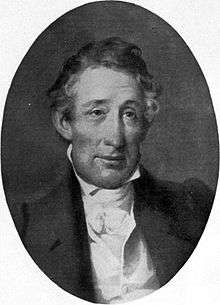George Ord
| George Ord | |
|---|---|
 | |
| Born |
March 4, 1781 Philadelphia, Pennsylvania |
| Died |
January 24, 1866 (aged 84) Philadelphia, Pennsylvania |
| Resting place | Gloria Dei Church cemetery |
| Nationality | American |
| Fields | naturalist, ornithologist |
George Ord (March 4, 1781 – January 24, 1866) was an American naturalist, ornithologist and writer.[1][2]
Ord was born in Philadelphia. His father (also named George) was a rope maker and Ord joined him in the business, continuing after his father's death in 1806. In 1829 he retired from the business so that he could devote more time to science.[2]
In 1815 Ord became a member of the Academy of Natural Sciences of Philadelphia, and two years later became a member of the American Philosophical Society. He went on to hold important positions in both. Ord received several of the specimens brought back by Lewis and Clark for description, including grizzly bear, black-tailed prairie dog and pronghorn.[2][3]
Ord was a friend and avid supporter of Alexander Wilson, accompanying him on several of his journeys. After Wilson's death he finished the eighth and ninth volumes of Wilson's American Ornithology. He issued a life of Wilson in 1828 and published biographies of his fellow naturalists Thomas Say (1834) and Charles Alexandre Lesueur (1849). He also assisted in the enlargement of Samuel Johnson's dictionary and the first edition of Noah Webster's dictionary. He was hostile to John James Audubon, whose drawings he disliked and who he felt was usurping the position of Wilson. He is buried in Philadelphia not far from Wilson in Gloria Dei Church cemetery.[1][2]
References
- 1 2 Rhoads, Samuel N. (1908). George Ord. pp. 1–8.
- 1 2 3 4 "George Ord Collection". American Philosophical Society.
- ↑ Guthrie, W.; Ferguson, J. (1815). A New Geographical, Historical, and Commercial Grammar and Present State of the Several Kingdoms of the World. 2. Philadelphia: Johnson & Warner. p. 308.
External links
- Dorof, Al. "George Ord (1781-1866)". Queen Village Neighbors Association. Reprint from Southwark Historical Society
- George Ord at Find a Grave